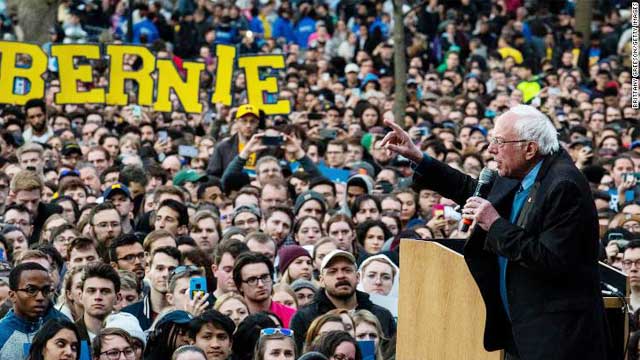Sen. Bernie Sanders ended his presidential campaign on Wednesday, clearing Joe Biden's path to the Democratic nomination and a showdown with President Donald Trump in November.
Sanders made the announcement in a call with his campaign staff, his campaign said.
"I wish I could give you better news, but I think you know the truth, and that is that we are now some 300 delegates behind Vice President Biden, and the path toward victory is virtually impossible," Sanders said in a livestream after the call. "So while we are winning the ideological battle and while we are winning the support of so many young people and working people throughout the country, I have concluded that this battle for the Democratic nomination will not be successful. And so today I am announcing the suspension of my campaign."
Sanders' exit caps a stunning reversal of fortune following a strong performance in the first three states that voted in February. The nomination appeared his for the taking until, on the last day of February, Biden surged to a blowout victory in South Carolina that set off a consolidation of moderate voters around the former vice president. The contest ends now as the country continues to grapple with the coronavirus pandemic, which halted in-person campaigning for both Sanders and Biden and has led many states to delay their primary elections.
Sanders said he did not make the decision lightly, describing it as a "very difficult and painful decision."
"Over the past few weeks Jane and I, in consultation with top staff, and many of our prominent supporters, have made an honest assessment of the prospects for victory. If I believed we had a feasible path to the nomination, I would certainly continue the campaign. But it's just not there," he said.
Sanders' departure from the race is a sharp blow to progressives, who rose up during and after the 2016 campaign and commanded the Democratic Party's Trump era debates over issues like health care, climate change and the effects of growing economic inequality.
But even as his policies grew more popular over the years and into the primary season, the Vermont senator struggled to broaden his own support and galvanize a winning coalition. Now, as he did after leaving the 2016 primary, Sanders will seek to influence the presumptive nominee through the means he knows best -- from the outside.
Biden has already made gestures toward Sanders' populist base, which formed a movement over the past five years that could be critical to defeating Trump in the fall. Whether the former vice president will take the necessary steps to win over the holdouts, and the extent to which Sanders goes to make the case, will be a running subplot until Election Day.
Sanders and Biden spoke Wednesday morning, with the Vermont senator telling the former vice president about his decision to end his presidential campaign, according to people familiar with the call.
In a statement after Sanders' announcement, Biden called the senator a "powerful voice for a fairer and more just America" and said his campaign's impact on the election is far from over. He also made an explicit call for Sanders' supporters to join him.
"And to (Sanders') supporters I make the same commitment: I see you, I hear you, and I understand the urgency of what it is we have to get done in this country. I hope you will join us. You are more than welcome. You're needed," Biden said."
Sanders acknowledged on Wednesday that some of his supporters would be disappointed by his exit.
"I know that there may be some in our movement who disagree with this decision, who would like us to fight on until the last ballot cast at the Democratic convention. I understand that position," Sanders said. "But as I see the crisis gripping the nation, exacerbated by a President unwilling or unable to provide any kind of credible leadership, and the work that needs to be done to protect people in this most desperate hour, I cannot in good conscience continue to mount a campaign that cannot win, and which would interfere with the important work required of all of us in this difficult hour."
The Sanders campaign held its final live public event on March 9, transitioning from packed, raucous rallies to an entirely digital operation. He communicated almost exclusively through virtual town halls and livestreams focused on the coronavirus crisis -- and how his progressive agenda, headlined by "Medicare for All," might have prevented it or helped cushion the blow.
In February, Sanders appeared poised to run away with the nomination after a strong performance in Iowa and victories in New Hampshire and Nevada, the latter by more than 25 percentage points, on the strength of his popularity with Latino voters, which had been courted relentlessly by his campaign.
But Sanders' momentum was dashed in South Carolina. Biden routed the field and then cleared it. The anti-Sanders vote rallied around him and, even with Sanders' win in California, put Biden in the driver's seat on Super Tuesday.
The wind at his back, the former vice president duplicated the feat a week later, delivering the hammer blow in Michigan, a state Sanders won in 2016 and viewed as crucial to his prospects in 2020. A day earlier, public safety measures in response to the coronavirus effectively ended the campaign roadshow.
Sanders would return to Vermont, where he has spent most of his time since, while Biden set up headquarters at home in Delaware. The Sanders fundraising machine, the most successful grassroots donor effort in American political history, was over the last month re-purposed into a feeder for public health groups.-CNN





